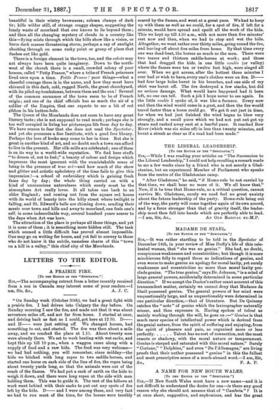MADAME DE STAEL. [To run EDITOR or ran .. 13rscrArOL"] Sta,—It
was rather startling to be told in the Spectator of December 24th, in your review of Miss Daffy's life of this cele- brated woman, that " she was no genius." She had, no doubt, conspicuous weaknesses and eccentricities; but though it is mere mischievous folly to regard these as indications of genius, and even worse to make genius an apology for moral laxity, yet surely weaknesses and eccentricities no more than moral laxity pre- clude genius. "The tree genius," says Dr. Johnson," is a mind of large general powers, accidentally determined in some particular direction." If we accept the Doctor's rather scant account of this transcendent matter, certainly we cannot deny that Madame de Stag possessed genius. The, general powers of her mind were unquestionably large, and as unquestionably were determined in one particular direction,—that of literature. But De Quincey catches the "note" of genius which the lexicographer naturally misses, and thus expresses it. Having spoken of talent as
mainly working through the will, he goes on Genius is that much rarer species of intellectual power which is derived from the genial nature, from the spirit of suffering and enjoying, from the spirit of pleasure and pain, as organised more or less perfectly Talent has no sort of connection,not the most remote or shadowy, with the moral nature or temperament. Genius is steeped and saturated with this moral nature." Surely "Corinne," " Delphine," and even "De rAllemagne," are living proofs that their author possessed " genius " in this the fullest and moat prescriptive sense of a much-abused word.—I am, Sir, 8cc., F. A. P.






































 Previous page
Previous page